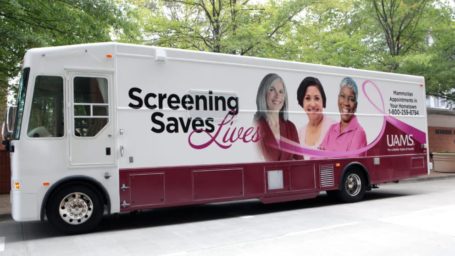This Program Addresses Entire Cancer Continuum
The Cancer Prevention & Population Science (CPPS) program at the UAMS Winthrop P. Rockefeller Cancer Institute conducts research to define etiologic factors underlying health disparities in the urban-rural continuum.
Learn MoreMission Statement
The main mission of this program is to address cancer health disparity in Arkansas. The overall cancer incidences of Arkansans are similar to those of the population of the United States at large. However, cancer mortality rates are higher among Arkansans. Documented lower screening rates for breast, cervical, and colon cancers likely explain such disparity at least partially. Access and quality of care after cancer diagnosis may also be a contributing factor given the largely rural nature of the state. The cancer types with most significant health care disparities in Arkansas have been identified, but are not limited to, breast, cervical, colon, lung, and prostate.
Our Approach
Our approach is team-oriented and translationally based that covers the entire cancer continuum — primary prevention, early detection, laboratory research, clinical trials and applications, diagnosis and treatment, quality of life, and survivorship.
Our research activities include evaluating primary and secondary prevention measures, understanding molecular factors associated with the development and optimal management of cancer, and assessing community-based strategies to improve cancer outcomes.
Research in the CPPS program is organized according to our social ecological model that progresses from discovery to intervention to dissemination.
Arkansas Rural Community Health Study
Welcome to the Arkansas Rural Community Health Study, formerly known as the Spit for the Cure. In order to continue our research efforts, it is important that you provide us with your updated contact information. Providing your updated information, just like your enrollment in the study itself, is completely voluntary and will not affect your medical care now or in the future.
Learn MorePrimary Areas of Research

Reduce Cancer Incidence and Progression
Done by identifying etiology and risk factors, as well as developing and implementing novel strategies/interventions to reduce cancer risk and improve cancer outcomes.

Decrease Regional Cancer Disparities
Done through developing and testing implementation methods of evidence-based dissemination strategies designed to promote cancer prevention and early detection.

Understand the Role of Immune System in Cancer Development
Also develop and test immune-mediated interventions for preventing cancers and recurrence of cancers, as well as reducing progression of cancers in a watchful waiting state.
Promoting Health of Women and Future Babies
We are looking for women ages between 18 and 50 who were recently diagnosed with HSIL or “cannot rule out HSIL” on Pap smear.
Learn MoreFeatured Publications
- Crown A, Berry C, Khabele D, Fayanju OM, Cobb A, Backhus L, et al. The Role of Race and Gender in the Career Experiences of Black/African-American Academic Surgeons: A Survey of the Society of Black Academic Surgeons and a Call to Action. Annals of surgery. 2020;(): .
- Jiang X, Finucane HK, Schumacher FR, Schmit SL, Tyrer JP, Han Y, et al. Shared heritability and functional enrichment across six solid cancers. Nature communications. 2019;10(1): 431. PMC6347624.
- Ramakrishnan S, Steck SE, Arab L, Zhang H, Bensen JT, Fontham ETH, Johnson CS, Mohler JL, Smith GJ, Su LJ, Woloszynska A. Association among plasma 1,25(OH)2D, ratio of 1,25(OH)2D to 25(OH)D, and prostate cancer aggressiveness. The Prostate. 2019;79(10): 1117-1124. PMC6593756.
- Ramos JC, Sparano JA, Chadburn A, Reid EG, Ambinder RF, Siegel ER, et al. Impact of Myc in HIV-associated non-Hodgkin lymphomas treated with EPOCH and outcomes with vorinostat (AMC-075 trial). Blood. 2020;136(11): 1284-1297. PMC7483436.
- Shibata T, Lieblong BJ, Sasagawa T, Nakagawa M. The promise of combining cancer vaccine and checkpoint blockade for treating HPV-related cancer. Cancer treatment reviews. 2019;78(): 8-16. PMC6710123.
- Taylor SE, Chu T, Elvin JA, Edwards RP, Zorn KK. Phase II study of everolimus and bevacizumab in recurrent ovarian, peritoneal, and fallopian tube cancer. Gynecologic oncology. 2019.
Meeting Time
The Cancer Prevention and Population Sciences Program meeting times vary.
Leader

